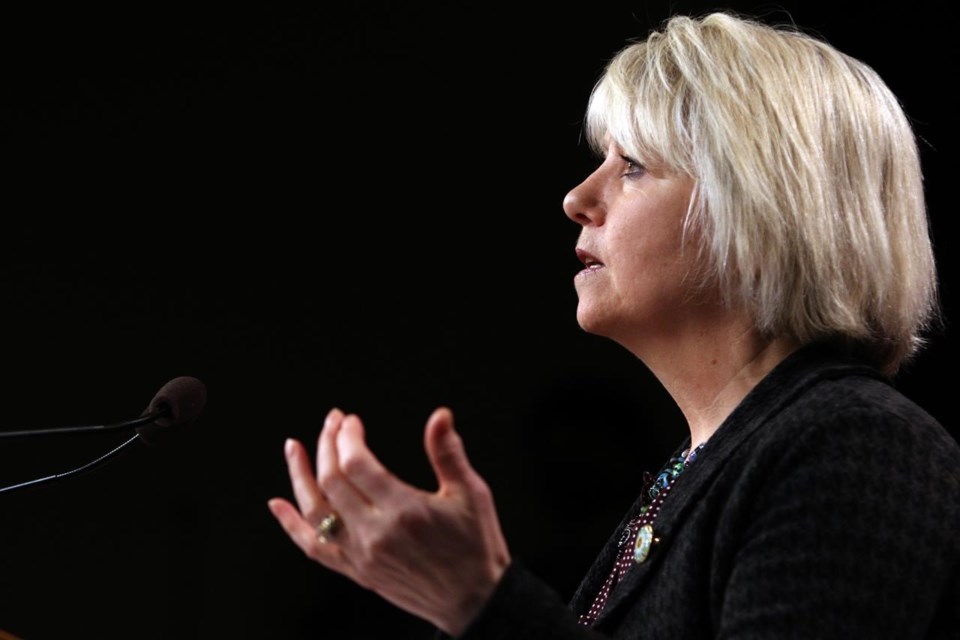VANCOUVER — Provincial Health Officer Dr. Bonnie Henry is urging patience from British Columbia's municipal leaders on drug decriminalization, saying more arrests won't address the complex issues of addiction.
However, Henry said she agrees that public drug use should not be accepted in areas when children are present.
Henry told politicians at the Union of B.C. Municipalities convention on Monday that B.C's drug decriminalization pilot program is "not perfect," but statistics show those most at risk of dying from overdoses are men between ages 30 and 59.
Henry told convention delegates stigmatization of drug use as a criminal activity has led people to consume and die alone.
Decriminalization is meant to "remove that label" from drug users to promote safer use and to save lives, she said.
In a later interview on Monday, Henry said she is preparing to release two reports with recommendations to government following reviews of B.C.'s safe supply program, launched in July 2021 to slow overdoses by offering prescribed medical alternatives to the toxic street supply.
"The premier actually, in response to concerns that were being raised by a number of people, asked me to do a review of the prescribed safer supply program that's in existence," Henry said in the interview.
Henry said her report will provide recommendations of medical models and other options available.
"I've been doing that over the last couple of months, meeting with prescribers, researchers, people with lived and living experience and community members across the province."
Henry said she will release a second report in the coming months that broadly examines safer supply programs and pharmaceutical alternatives to the street drug supply.
"We're looking at some of the research and other factors around that and that will come out probably later this year or early in the new year," she said.
The BC Coroners Service reported last month there were at least 1,455 deaths in the province attributed to toxic drugs so far this year, with 12,739 overdose deaths since April 2016, when the province first declared a public health emergency.
Decriminalization is one of the key topics at the convention of local politicians this week, as delegates are expected to vote on resolutions asking government to expand prohibitions on possession and use to parks, bus stops, sports fields and other places where children gather.
"In some ways, I see the decriminalization of people who use drugs as an impetus to have these really difficult discussions with a lot of local governments," Henry said following her UBCM presentation. "I wasn't hearing that people want to go back to criminalizing and having criminal penalties for people who use drugs."
"What I heard a lot of was the ongoing social issues communities are dealing with are very, very difficult for them," she said.
Smithers Mayor Gladys Atrill said at the convention that small-town B.C. needs more resources because addiction and mental health issues are not limited to urban areas.
"The scale of the problem in our little community, I think, would astonish people when they come there," she said. "We see what happens in the Downtown Eastside, it's in the news. Our town's not in the news, but it's the same."
Another resolution facing a vote asks the province to better fund mental-health and addiction treatment, recovery services, overdose prevention and access to safe supply and drug testing
The resolution says there's currently inadequate money to ensure the safety of people who use illicit drugs.
Both resolutions will go to a vote on Wednesday, with the funding proposal already endorsed by the group's resolutions committee, which hasn't taken a position on expanding prohibition zones.
The resolutions come after the federal government approved changes of a pilot project launched in B.C. earlier this year that decriminalizes possession of small amounts of illicit drugs.
The changes that came into force Monday prohibit possession within 15 metres of a park or child-focused space.
Henry said the federal amendments show that the province, which requested the changes, is responding to local complaints.
"None of us wants drug use around our children," Henry said "But we need to look at these issues in ways that we can support public safety, we can support police and we can also support people who are more vulnerable."
The proposed UBCM resolution urges the province to introduce legislation this fall to further regulate the "possession and use" of illicit drugs where children gather.
"(Concerns) have been raised by local governments since the pilot project began in January 2023 on the public use of illicit drugs in child-focused spaces such as parks and playgrounds," the resolution says.
Intoxication in all public places remains illegal.
More than 2,000 people are registered to attend the annual gathering of elected municipal leaders that concludes Friday with a speech by Premier David Eby.
UBCM president Jen Ford says the convention comes as communities tackle wildfires, housing woes, mental health and addictions, with some facing multiple emergencies.
She said municipal leaders are looking to the province to ease bureaucracy to access funds to make their communities safer from wildfires.
This report by The Canadian Press was first published Sept. 18, 2023.
The Canadian Press




